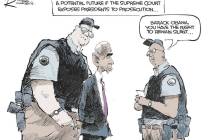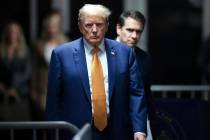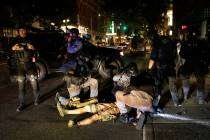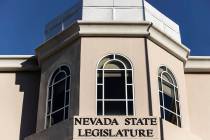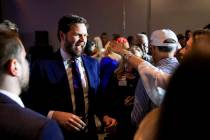Speech for the ages
It's hard to find a speech that transcends politics these days. No one will confuse the talking points of cookie-cutter candidates with Winston Churchill's sweeping rhetoric.
More people get what little news they get from television than from radio or newspapers, and most people younger than 25 are more adept at text messaging than listening. On Tuesday, I turned to cable television to watch what my text message from the Barack Obama campaign promised was an important message.
CNBC had a countdown clock like you used to only see on New Years Eve. Only this was for the Federal Reserve Bank's interest-rate decision in three hours and 20 minutes.
When Obama did appear on the screen it wasn't for a stump speech or a policy address, which we've all become accustomed to these days. Instead, the Illinois senator spoke of race and religion, American society and politics in ways no other elected official has in my memory.
The last time I heard such an honest evaluation of the black community was in Spike Lee's "Do the Right Thing," a film some criticized for playing on stereotypes, but what I saw as an insightful look at how difficult it can be to straddle the sometimes-conflicting messages of Martin Luther King Jr. and Malcolm X.
In the race for the Democratic presidential nomination that lately has been all about race, it took the nearly 40-minute speech by Obama to once again show why he is the most transcendent political figure of my lifetime.
Sometimes it's hard to watch a politician speak, particularly when he or she is using a fairly iconic backdrop. Even recent inaugural addresses don't seem to live up to the prose or passion of those who also lived in the White House, served in Congress or walked the mall past memorials to those who we dutifully remember.
Obama gave his speech at Philadelphia's National Constitution Center across the street from the cradle of our republic. And he told his American story like only he can, with the kind of gripping honesty you find in his first book.
There in Pennsylvania, which holds the next primary election April 22, Obama stood up to once again wrest control of the Democratic nomination from the cacophony of inflammatory talk that keeps cable television aflutter with "analysis" of race in America.
Obama condemned the statements of his pastor, the Rev. Jeremiah Wright, who, among other things, used the events of Sept. 11, 2001, as a call to parishioners to ask God to damn the United States. Obama said we've seen Wright "use incendiary language to express views that have the potential not only to widen the racial divide, but views that denigrate both the greatness and the goodness of our nation -- that rightly offend white and black alike."
The senator so repudiated Wright's "profoundly distorted view" of our country that it would seem any general election attack linking Obama to his pastor's foreign policy ideas will be accompanied in news reports with excerpts from Tuesday's speech.
By expanding his denouncement of Wright's statements to a larger speech on race, Obama didn't just put an end to questions about his ties to the south side Chicago church he has attended for 20 years. He also explained why he cannot and should not denounce his pastor.
It's easy to fire an exuberant campaign operative for saying something screwy. But it's not at all easy to lead an honest discussion about America's future by being dishonest to your own race or faith. That's what former GOP presidential candidate Mitt Romney talked about in his speech about the Mormon religion.
For Obama to walk away from his church or the pastor who officiated his wedding and baptized his children, would have in fact been to walk away from the black community.
"I can no more disown him than I can my white grandmother -- a woman who helped raise me, a woman who sacrificed again and again for me, a woman who loves me as much as she loves anything in this world, but a woman who once confessed her fear of black men who passed her on the street, and who on more than one occasion has uttered racial or ethnic stereotypes that made me cringe," he said.
Whether it is the controversy about the Rev. Wright or the statements former vice presidential nominee Geraldine Ferraro made about Obama being where he is because he is black, race has once again dominated the discussion.
As he so often does, Obama set his speech against the nation's history, speaking of the Constitution as the search for a more perfect union.
"The fact is that the comments that have been made and the issues that have surfaced over the last few weeks reflect the complexities of race in this country that we've never really worked through -- a part of our union that we have yet to perfect," he said.
And while it would be easier to demagogue Wright and Ferraro, as Obama noted, it wouldn't exactly be the way to make those signature changes in America.
Contact Erin Neff at (702) 387-2906, or by e-mail at eneff@reviewjournal.com.










